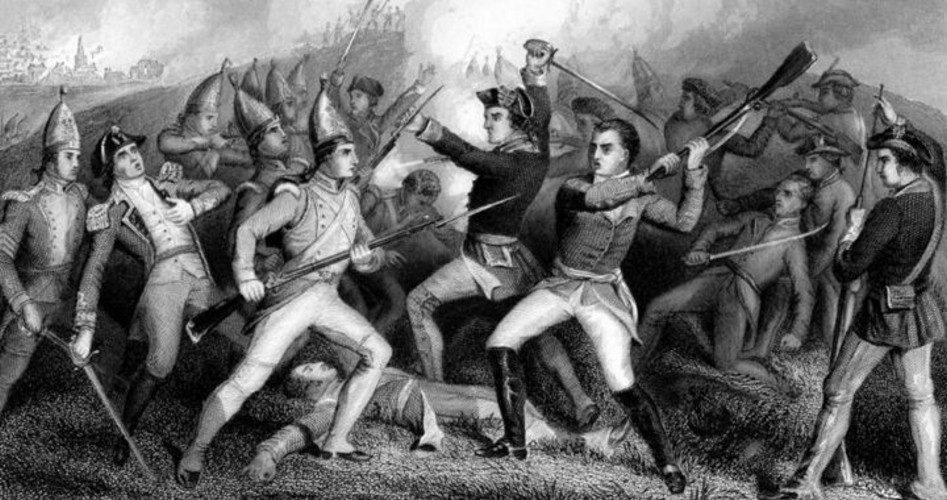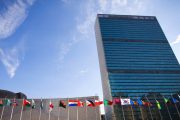
Speaking this week to the United Nations General Assembly in his final address to that body, President Barack Obama continued to reveal his contempt for America’s founding. “Our nation began with a promise of freedom that applied only to the few,” Obama said during a speech whose theme was a call for an increase in the power of international institutions and a reduction in national sovereignty of individual nations, including the United States.
This assertion — that America’s founding brought the blessings of liberty only to a few Americans — should be coupled with Obama’s call for decreased American national sovereignty. After all, if America’s national founding is not all that special, then the submission of the United States into some global government is not all that big of a deal.
Obama did allow that “because of our democratic Constitution, because of our Bill of Rights, because of our ideals, ordinary people were able to organize, and march, and protest, and ultimately, those ideals won out — opened doors for women and minorities and workers in ways that made our economy more productive and turned our diversity into a strength.”
He concluded this thought by adding that all of this marching and protesting did eventually “make it possible for someone like me to be elected President of the United States.”
So summarizing Obama’s position, while the American Revolution brought liberty to a tiny number of individuals living in the new United States, the liberty of other “ordinary people” was non-existent until organizing, marching, and protesting won them that liberty. And elected a former community organizer such as Obama president.
This is a version of history that ignores the facts, substituting them for progressive ideology. The progressives of the early 20th century — the intellectual ancestors of Obama, Hillary Clinton, and large numbers of the political class of America today made no secret that they believed the American founding was, at the least, insufficient. In an interview in 2001, given long before Obama was in the U.S. Senate, he lamented the Constitution was just “a charter of negative liberties. It says what the states can’t do to you. Says what the federal government can’t do to you but doesn’t say what the federal government or state government must do on your behalf.”
Here we have an insight into what Obama meant by his recent statement to the United Nations that America was launched with a “promise of freedom that applied only to the few.” If one believes as Obama and others on the Left believe that the government doing something for you is “liberty,” then his statement makes sense. As Obama told Joe the Plumber back in 2008, he believes everyone does better if we “spread the wealth around.”
At another point in his speech to the UN, Obama said that in order to bridge the gap between rich and poor, we could not rely simply on “soulless capitalism,” but would need to increase the ability of government to respond to the demands for benefits. He took credit that, during his tenure as president, the United States has “worked with many nations to curb the excesses of capitalism.”
After telling the General Assembly delegates, “Our nation began with a promise of freedom that applied only to the few,” he added, “But because of our democratic Constitution,” this “promise” of share of the wealth was now additionally applied to the majority by organizing, marching, and protesting.
This has to be what Obama is really saying. The Constitution specifically protected religious liberty, the right to keep and bear arms, the right of free speech and press, peaceful assembly, and the right to petition the government for a redress of grievances. The Constitution did not say that these specifically protected rights only apply to the few, but rather to “the people.” All persons were included in the Fourth Amendment’s protections against unreasonable searches, for example.
And the Fifth Amendment’s statement is, “Nor shall any person be subject twice put in jeopardy of life or limb.”
It doesn’t say, “Only the few shall be protected from double jeopardy.”
But admittedly, the founding generation did not believe it was the role of government to “spread the wealth around.” On the other hand, they firmly believed it was government’s role to protect private property, and the fruit of one’s labors. Because of this, Americans prospered, and millions came to these shores to share in that prosperity. They did not come, expecting some progressive politician was going to take wealth from one person who had more and give it to another person who had less.
In his address at the UN, Obama made it clear that not only should Americans redistribute the wealth of fellow Americans through government action, he wants the wealth of America shared with the rest of the world. “And just as we benefit by combatting inequality within our countries, I believe advanced economies still need to do more to close the gap between rich and poor nations around the globe.”
Admitting the political difficulty of getting Americans to surrender their wealth to other peoples around the world, Obama continued, “It’s difficult to spend on foreign assistance. But I do not believe this is charity.” In one sense, Obama is right. It is not charity. Charity is when individual citizens voluntarily transfer some of their possessions to someone else. Government taking someone’s wealth and giving it to someone else down the street, or half-way around the world is certainly not charity. If you or I strong-armed some money away from some wealthy woman walking down the street and took it to a poor family in our town, we would most likely be visited by the police later that day. But if done by government, in either D.C., or perhaps at the UN, it is just “spreading the wealth around.”
It is clear, then, that Obama considers the redistribution of wealth “freedom.” This was not the prevailing viewpoint at the time of America’s founding. At that time, liberty meant the right to conduct one’s own affairs without thieves taking the fruit of one’s labors. And while Americans have gradually surrendered much of their liberty over the years in exchange for increased government-provided “security,” enough of the founding philosophy still existed in 2008 for candidate Obama to call for a “fundamental transformation” of America to change that self-reliant attitude.
For this to be accomplished, Americans must be convinced that their country held nothing special in its founding principles, and submersion into a world government (“integration” as they now put it) is no big deal. In that regard, Obama’s speech also called for the need for “global education” for young people. Accordingly, he offered what he called a “course correction” which is necessary to achieve “global integration.”
In order to achieve this, Obama said he is “convinced that in the long run, giving up some freedom of action … binding ourselves to international rules over the long term — enhances our security.”
This statement, in which Obama calls for the United States to bind ourselves to “international rules” is a contradiction of the “promise of freedom” that launched our nation with a Declaration of Independence. Instead of binding ourselves to the UN, we should bind governmental officials, whether found at the UN or in D.C. As Thomas Jefferson said in the Kentucky resolution opposing the Sedition Act of 1798, “In questions of power then, let no more be heard of confidence in man, but bind him down from mischief by the chains of the constitution.”
Of course, that is an example of negative liberty, and not the type of “freedom” sought by community organizers such as Barack Obama, who think “freedom” means spreading the wealth around.



